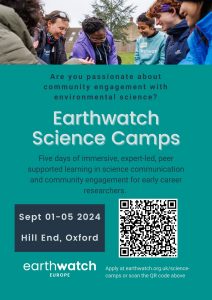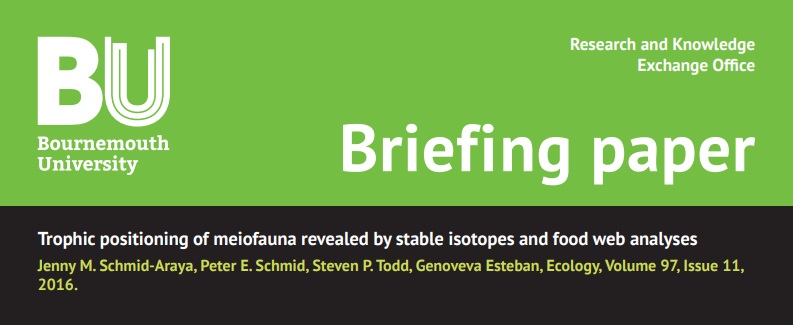The applications are now open for the September 2024 Earthwatch Science Camp.
These unique residential learning events give early career environmental researchers the opportunity to gain hands-on experience in how to engage communities in their research. The training is also ideal for those who want to explore how research, citizen science and science communications can benefit the communities they are working with.
The deadline for applications for the September camp is 23rd June 2024
Please find the link to the Earthwatch Science Camp September 2024 Application Form
More information is available on Earthwatch Europe’s website and a short film of Science Camp on youTube, which goes into more detail about the background and objectives of the training.

 NERC is now seeking ideas for research challenges that should be priorities for strategic research investment through highlight topics. NERC would welcome ideas from both researchers and those who use environmental science research.
NERC is now seeking ideas for research challenges that should be priorities for strategic research investment through highlight topics. NERC would welcome ideas from both researchers and those who use environmental science research. Bournemouth University Research Associate Katie Thompson from the Department of Life and Environmental Sciences (SciTech) was delighted to be accepted on to the prestigious European Space Agency Earth observation summer school for two weeks this month. The course took place at ESRIN headquarters in Rome, which is the ESA establishment responsible for managing the operation and exploitation of ESA’s Earth Observation satellites. It was a fantastic opportunity to work together with experts as well as 70 fellow PhD and Postdoctoral students from a broad range of different research institutions. The summer school focused on concepts of remote sensing, Earth system science, modelling and monitoring, and how data can be used to better understand the world we live in. Further research developments will play a essential part of Katie’s research, concerning African savanna elephants (Loxodonta Africana) and their impacts at an ecosystem level that will rely on analysis of remotely sensed imagery to elucidate vegetation dynamics.
Bournemouth University Research Associate Katie Thompson from the Department of Life and Environmental Sciences (SciTech) was delighted to be accepted on to the prestigious European Space Agency Earth observation summer school for two weeks this month. The course took place at ESRIN headquarters in Rome, which is the ESA establishment responsible for managing the operation and exploitation of ESA’s Earth Observation satellites. It was a fantastic opportunity to work together with experts as well as 70 fellow PhD and Postdoctoral students from a broad range of different research institutions. The summer school focused on concepts of remote sensing, Earth system science, modelling and monitoring, and how data can be used to better understand the world we live in. Further research developments will play a essential part of Katie’s research, concerning African savanna elephants (Loxodonta Africana) and their impacts at an ecosystem level that will rely on analysis of remotely sensed imagery to elucidate vegetation dynamics. Our
Our 










 New CMWH paper on maternity care
New CMWH paper on maternity care From Sustainable Research to Sustainable Research Lives: Reflections from the SPROUT Network Event
From Sustainable Research to Sustainable Research Lives: Reflections from the SPROUT Network Event REF Code of Practice consultation is open!
REF Code of Practice consultation is open! ECR Funding Open Call: Research Culture & Community Grant – Apply now
ECR Funding Open Call: Research Culture & Community Grant – Apply now ECR Funding Open Call: Research Culture & Community Grant – Application Deadline Friday 12 December
ECR Funding Open Call: Research Culture & Community Grant – Application Deadline Friday 12 December MSCA Postdoctoral Fellowships 2025 Call
MSCA Postdoctoral Fellowships 2025 Call ERC Advanced Grant 2025 Webinar
ERC Advanced Grant 2025 Webinar Update on UKRO services
Update on UKRO services European research project exploring use of ‘virtual twins’ to better manage metabolic associated fatty liver disease
European research project exploring use of ‘virtual twins’ to better manage metabolic associated fatty liver disease